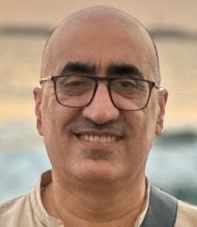Dr Liaqat Ali
The soul is an abstract entity, unbound by time and space. It traverses history, extracting meaningful discourse to address the present and shape the future.
Plato’s Symposium is a Socratic dialogue, an intellectual gathering where philosophy dissects love, ego, and politics. In the modern era, however, discussions are often dominated by hysteria and polarized narratives rather than reasoned debate. The month of Ramadan, a time for introspection and unity, has instead witnessed brutalities fueled by the cries of delusional, stereotyped, and preoccupied pseudo-intellectuals.
One night, I found myself transcending the 21st century, transported to Plato’s Symposium. There, I pleaded the case of my homeland, Pakistan, a land burdened by distrust among its federating units, plagued by planted narratives, and bearing the weight of an unsettled Odyssey in Parachinar.
From the depths of the dialogue, I heard the voice of Plato: “My son, tell your countrymen not to blindly follow the opinions of the majority or the so-called wise. The three dominant forces shaping Pakistan today are Drama, Rhetoric, and Dialectic.”
Then, Socrates placed a reassuring hand on my shoulder. “Tell your decision-makers to adopt my method,” he said. “Engage in rigorous questioning, seek the truth through extensive dialogue, and expose the ignorance through self-reflection. Recognize the meddlers, the opportunistic media houses, and those who peddle false narratives.” As I listened, I saw the multi-colored masks of those propagating religious intolerance, racial supremacy, and masochistic ideologies, each controlled by hidden hands.
Alcibiades, the legendary general and statesman, stared into my eyes and spoke with solemnity. “A new social contract within the constitutional framework is essential. The native people of the land must be made stakeholders in their own resources, bound by loyalty to the state of Pakistan. Also give honor to the language, culture, women and tribal elders of Baloch and win their hearts. Incentivize the youth of Balochistan and Khyber Pakhtunkhwa, break the rhetoric of injustice, and transform the untapped potential of Gwadar and KP’s mineral wealth into human development projects. Remember, you cannot win a war when the opponent is yourself. Change the minds, win the hearts, and expose those who spread hatred.” He paused before concluding, “This is my message to your civil and military establishment: identify the unknown.”
From my bench in Symposium, I saw Diotima of Mantinea, the philosopher of love. I found myself comparing her to Pakistan’s contemporary icon of resistance, Dr Mahrang Baloch. Diotima, however, laughed and dismissed the comparison. “I have always taught love, not hatred,” she said. “Yes, Mahrang Baloch was ignored by the power corridors during her sit-in. But why did she overlook the civil rights activists who stood by her, offering warmth, support, and solidarity? Why did she not denounce the massacre of innocent passengers on Jaffer Express? Why did she not grieve for the poor Punjabi laborers who died working to sustain Balochistan’s infrastructure?”
Then came Agathon, the tragic poet, and Pausanias, the legal expert. I presented my concerns over the distrust in state institutions, the disharmony in political identities, and the wavering loyalties. They outlined the philosophical journey from assumption to reality, emphasizing the shortsightedness of Baloch separatists and religious zealots in KP. “Do they realize,” Pausanias mused, “that Balochistan is home to Pashtuns, Hazaras, Uzbeks, Tajiks, and settlers from Sindh and Punjab? Many of those settlers were the province’s academic backbone, eliminated at point-blank range to silence wisdom. And if separatists succeed, do they not see that an external empire, sophisticated and diplomatically adept, will annex their so-called independent land in a heartbeat? Judiciary elsewhere will take mere days to carry out public executions.”
Turning his gaze towards Pakistan’s religious factions, Pausanias said wryly, “Tell your self-proclaimed guardians of faith to first implement Islamic jurisprudence within their homes. Let them start with Surah Al-Nisa, ensuring that women receive their rightful inheritance before falsely cloaking patriarchal customs in religious justifications.”
As my transcendence ended, I returned to the 21st century, searching for reason amid the chaos. I switched on the television, only to find parliamentary sessions marred by uproar, infotainment channels dominated by political theatrics, and self-proclaimed experts spewing opinions devoid of research. The nation’s discourse had been reduced to smoke and mirrors, where credibility was sacrificed for ratings and financial incentives.
I whispered to myself: Plato’s Symposium, the wisdom of Socrates, the message of Alcibiades, the lament of Diotima, and the reality check of Agathon, all lost in the din of soundbites and fleeting trends. As the nation laughed at viral memes, I reflected on a truth too dire to ignore: Pakistan is in desperate need of a Symposium.
The writer is a Professor of Urology at the Institute of Kidney Diseases (IKD), Peshawar, and Director Urology Disease Registry of Pakistan (URoP). He can be reached at: liaqat_99@yahoo.com.
Related Posts






Comments